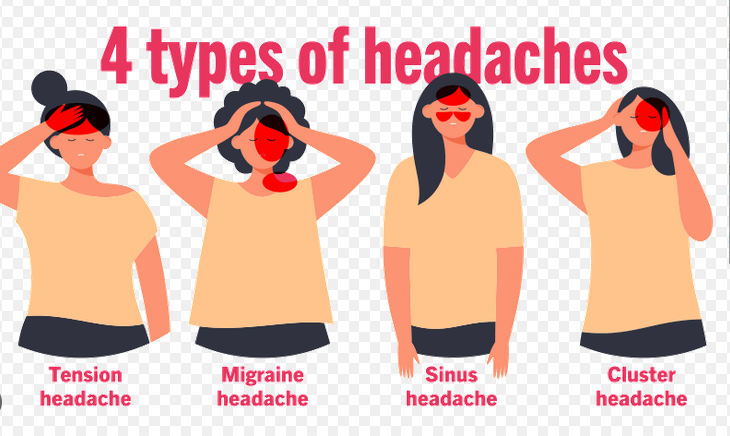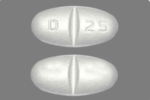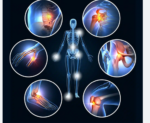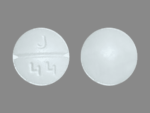Trazodone is sometimes used off-label for the management of chronic headaches, particularly tension-type headaches and migraines. Although it is primarily an antidepressant, its sedative properties, effects on serotonin levels, and ability to improve sleep make it useful in certain headache conditions, especially for patients who experience sleep disturbances or anxiety alongside their headaches. A headache is a pain in your head or face that’s often described as a pressure that’s throbbing, constant, sharp or dull.
Headaches can differ greatly in regard to pain type, severity, location and frequency. 
Headaches are a very common condition that most people will experience many times during their lives. They’re the most common form of pain and are a major reason cited for days missed at work or school, as well as visits to healthcare providers.
While most headaches aren’t dangerous, certain types can be a sign of a more serious condition.
Types of Headaches Trazodone is Used For
- Chronic Tension-Type Headaches (TTH):
- Tension-type headaches are often described as a band-like pressure around the head, typically associated with muscle tension in the neck, scalp, or shoulders. They are the most common type of headache and can be triggered by stress, anxiety, or poor posture.
- Chronic Migraines:
- Migraines are more severe, often unilateral, and can be accompanied by symptoms such as nausea, vomiting, sensitivity to light and sound, and throbbing pain. Chronic migraines are defined as having headaches on more than 15 days per month for at least three months, with at least eight of those days being migraine days.
- Cluster Headaches (less commonly):
- Cluster headaches are severe, unilateral headaches that occur in cyclical patterns or “clusters.” Trazodone is not a primary treatment for cluster headaches, but its sedative effects and ability to improve sleep might provide some relief in cases where sleep disturbances exacerbate the condition.
How Trazodone Helps with Headaches
- Serotonin Modulation:
- Serotonin plays a critical role in headache pathophysiology, particularly in migraines. Trazodone increases serotonin levels by inhibiting its reuptake, which can help reduce the frequency and intensity of headaches, particularly migraines.
- The 5-HT2A receptor antagonist action of Trazodone may help in reducing vasodilation (blood vessel widening) in the brain, which is thought to contribute to migraine pain.
- Improved Sleep:
- Sleep disturbances are common in patients with chronic headaches. Poor sleep can worsen headache frequency and severity, creating a vicious cycle. Trazodone’s sedative effects help improve sleep quality, which is crucial for headache management.
- By promoting deep, restorative sleep, Trazodone reduces headache-related fatigue and prevents sleep deprivation, which is a common trigger for both tension-type headaches and migraines.
- Muscle Relaxation:
- Tension-type headaches are often linked to muscle tension in the head, neck, and shoulders. Trazodone’s alpha-1 adrenergic receptor blockade helps to reduce muscle tension and promote relaxation, which can be particularly beneficial for tension-type headaches.
- This reduction in physical tension can help alleviate the pressure and discomfort that characterizes these headaches.
- Anxiolytic Effects:
- Anxiety is a common trigger for both migraines and tension-type headaches. Trazodone’s ability to reduce anxiety can help lower the frequency of stress-induced headaches. By calming the nervous system, it prevents the physical and emotional stress that often contributes to headache episodes.
- Reduction of Hyperarousal:
- For patients who experience hyperarousal or heightened sensitivity to external stimuli (common in migraines), Trazodone can help by reducing the body’s overall state of heightened alertness. This can prevent the worsening of headaches caused by external triggers like bright lights or loud sounds.
Dosage of Trazodone for Headache Management
- Starting Dose: A typical starting dose for headache management is 50-100 mg at night. This helps assess how well the patient tolerates the medication, especially considering its sedative effects.
- Maintenance Dose: Depending on the patient’s response, the dose may be increased to 100-200 mg per night, focusing on improving sleep quality and reducing headache frequency.
- Maximum Dose: In more severe cases or when treating comorbid conditions like anxiety or depression alongside headaches, doses can go up to 300 mg per night, although higher doses are rare for headache management alone.
How Trazodone Compares to Other Headache Treatments
Trazodone is not a first-line treatment for chronic headaches, especially migraines. However, it can be helpful in specific circumstances, particularly when headaches are accompanied by insomnia, anxiety, or depression. It is often used as part of a multimodal treatment approach alongside other medications, such as:
- NSAIDs or Acetaminophen: For acute headache relief.
- Triptans: Specifically for migraines to stop the headache once it starts.
- Antidepressants (e.g., Amitriptyline) or Anticonvulsants (e.g., Topiramate): Commonly used preventatives for migraines and chronic tension headaches.
- Beta-blockers (e.g., Propranolol): Often used to prevent migraines.
Side Effects Related to Headache Treatment
- Drowsiness:
- This is the most common side effect of Trazodone, especially at doses used for improving sleep. While beneficial for nighttime use, it can cause grogginess the next day if the dose is too high or if patients don’t get a full night’s sleep.
- Orthostatic Hypotension:
- A drop in blood pressure when standing up can cause dizziness, lightheadedness, or fainting, which can be problematic, especially for older adults.
- Dry Mouth and Headaches:
- Ironically, some patients may experience headaches as a side effect, although this is usually transient and diminishes as the body adjusts to the medication.
- Cognitive and Motor Impairment:
- Higher doses can cause cognitive slowing or difficulty with motor coordination, though this is less common than with other sedatives.
- Gastrointestinal Issues:
- Some patients may experience nausea or constipation, although these side effects are generally mild and manageable.
Long-Term Use and Efficacy
Trazodone can be used safely over the long term for headache management, particularly for those who also suffer from insomnia, anxiety, or depression. Regular follow-ups with a healthcare provider are necessary to monitor efficacy and side effects.
Potential Drug Interactions
- Serotonergic Drugs:
- Combining Trazodone with other serotonin-enhancing drugs (e.g., SSRIs, triptans for migraines) increases the risk of serotonin syndrome, a serious condition characterized by agitation, confusion, and muscle rigidity.
- CNS Depressants:
- Combining Trazodone with alcohol, benzodiazepines, or opioids can enhance its sedative effects, increasing the risk of excessive sedation or respiratory depression.
- Blood Pressure Medications:
- Trazodone’s effect on blood pressure may interact with antihypertensive drugs, potentially causing dangerously low blood pressure.
Advantages of Trazodone for Headache Management
- Dual Action on Sleep and Pain:
- Trazodone’s ability to improve both sleep and reduce anxiety or tension makes it ideal for patients whose headaches are closely tied to these issues.
- Non-Addictive:
- Unlike many other medications used for headache relief (like benzodiazepines or opioids), Trazodone does not carry a significant risk of dependence or tolerance, making it suitable for long-term use.
- Minimal Cognitive Side Effects:
- While it does have sedative effects, Trazodone is generally well-tolerated and has fewer cognitive side effects compared to other sleep aids or antidepressants, such as benzodiazepines or tricyclic antidepressants.
In summary, Trazodone can be a helpful off-label option for managing chronic headaches, particularly for patients who also struggle with sleep disturbances, anxiety, or depression. While not a primary treatment for headache disorders, it can be part of a broader therapeutic strategy to manage headache-related symptoms and improve overall quality of life. Regular monitoring is important to adjust doses and minimize side effects.
Pain Medications, Pain Relief, and Pain Management








yi8zux